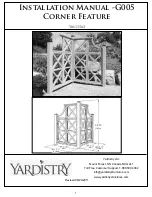
• 3 •
WARNING
RISK OF EXPLOSIVE GASES.
1.5
WORKING IN THE
VICINITY OF A LEAD-ACID
BATTERY IS DANGEROUS.
BATTERIES GENERATE
EXPLOSIVE GASES DURING
NORMAL BATTERY OPERATION.
FOR THIS REASON, IT IS OF
UTMOST IMPORTANCE THAT YOU
FOLLOW THE INSTRUCTIONS EACH
TIME YOU USE THE TESTER.
1.6
To reduce the risk of a battery
explosion, follow these instructions
and those published by the battery
manufacturer and the manufacturer
of any equipment you intend to use in
the vicinity of the battery. Review the
cautionary markings on these products
and on the engine.
2. PERSONAL PRECAUTIONS
WARNING
RISK OF EXPLOSIVE GASES.
2.1
NEVER smoke or allow a
spark or flame in the vicinity of
a battery or engine.
2.2
Remove personal
metal items such as rings, bracelets,
necklaces and watches when working
with a lead-acid battery. A lead-acid
battery can produce a short-circuit
current high enough to weld a ring or
the like to metal, causing a severe burn.
2.3
Be extra cautious, to reduce the risk of
dropping a metal tool onto the battery. It
might spark or short-circuit the battery or
other electrical part that may cause an
explosion.
2.4
Consider having someone nearby to
come to your aid when you work near a
lead-acid battery.
2.5
Have plenty of fresh water and soap
nearby in case battery acid contacts
your skin, clothing or eyes.
2.6
Wear complete eye and body
protection, including safety goggles and
protective clothing. Avoid touching your
eyes while working near the battery.
2.7
If battery acid contacts your skin or
clothing, immediately wash the area
with soap and water. If acid enters
your eye, immediately flood the eye
with cold running water for at least
10 minutes and get medical attention
right away.
2.8
If battery acid is accidentally
swallowed, drink milk, the whites
of eggs or water. DO NOT induce
vomiting. Seek medical attention
immediately.






























